Key takeaways:
- Animal adoption provides compassionate second chances for animals, fostering deep connections and transforming lives.
- Breeding focuses on specific traits, often at the cost of the animals’ well-being and contributes to shelter overpopulation.
- Adopting pets helps combat the pet overpopulation crisis and offers the joy of giving animals a loving home.
- Irresponsible breeding can lead to health issues and ethical concerns, highlighting the importance of responsible practices.
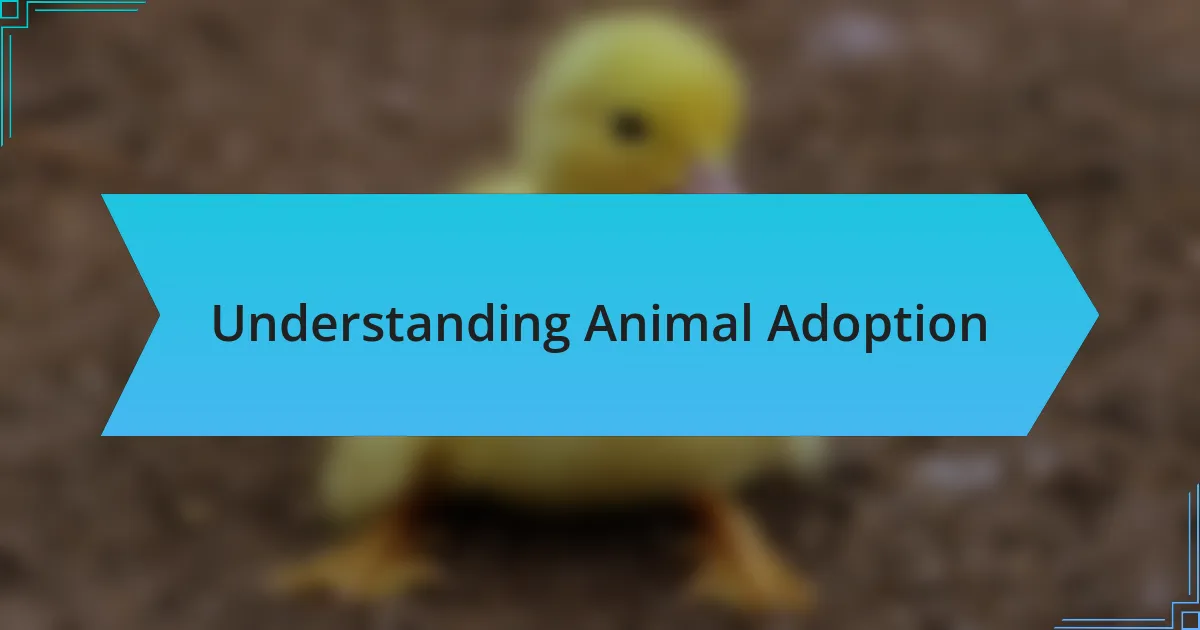
Understanding Animal Adoption
Adoption is a profound act of compassion that provides a second chance for animals in need. I remember the day I brought home my rescue dog, Scout. His eyes were filled with a mix of hope and uncertainty, and I realized then how much an adoption truly transforms both the animal and the adopter’s life.
One often overlooked aspect of adoption is the deep bond that forms when you give an animal a loving home. Have you ever considered how many animals are waiting for that special moment? Each one has its own story, and often, the act of adopting means you’re not just providing a home but sharing an adventure together.
The process of adoption can bring a wide range of emotions for both the animal and the person involved. The joy of seeing an animal adjust to a new environment can be incredibly rewarding. I’ve witnessed the transformation of shy animals blossoming into playful companions, which makes me wonder: how can we not open our hearts to these deserving creatures?
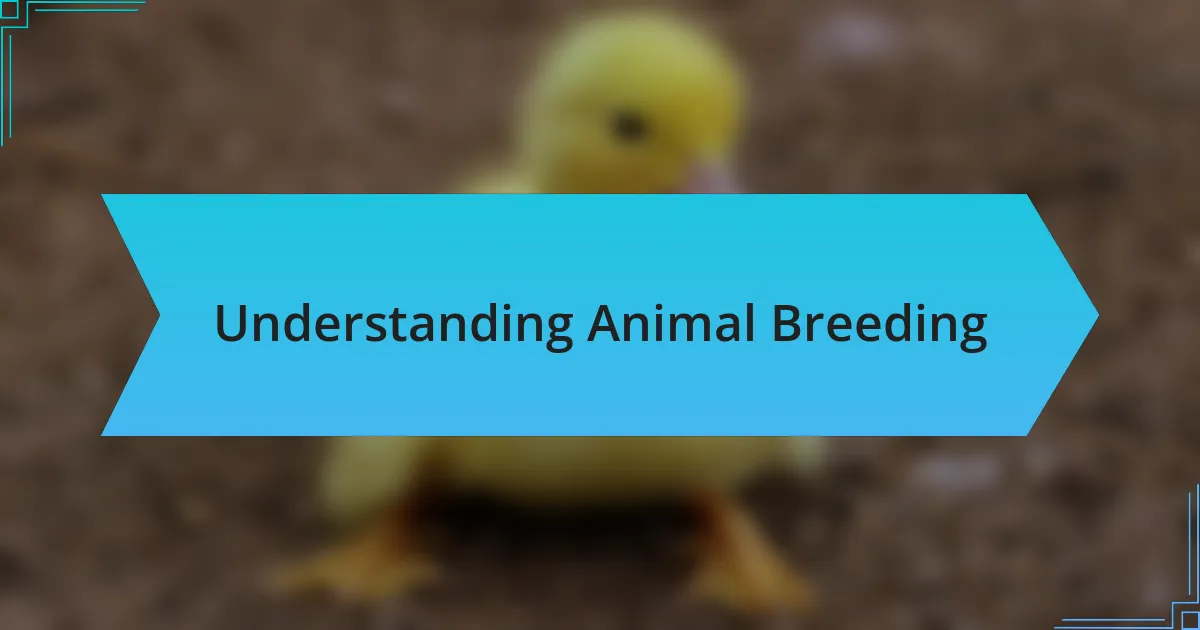
Understanding Animal Breeding
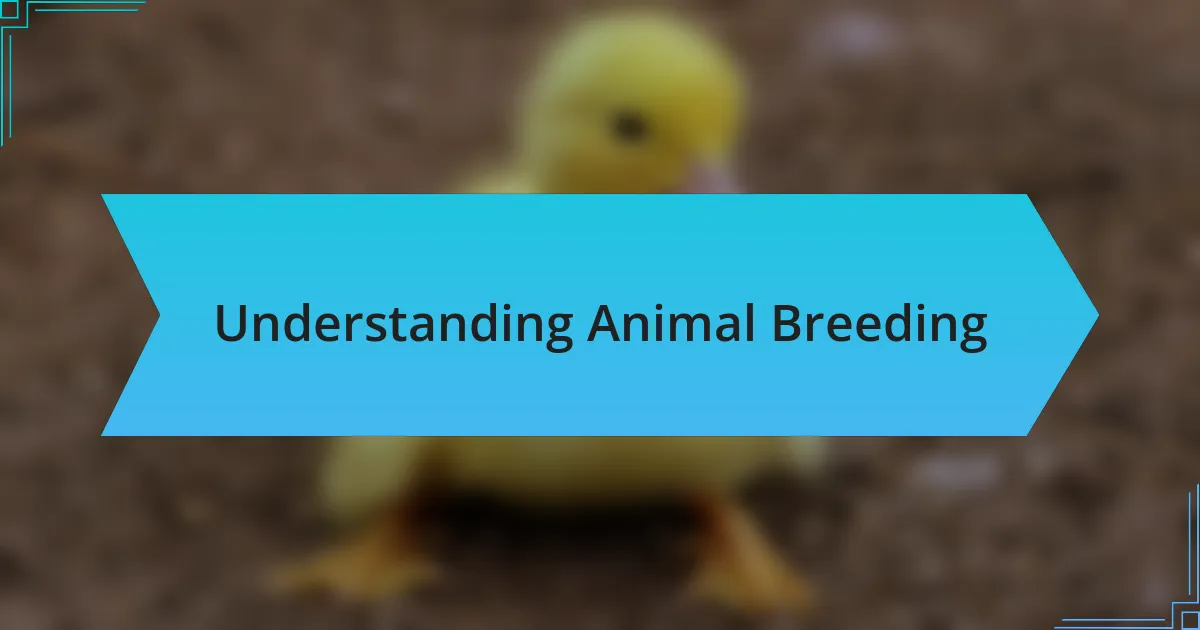
Understanding Animal Breeding
Animal breeding involves selectively mating animals to produce specific traits and characteristics. Unlike adoption, where the focus is on providing a home to animals in need, breeding often prioritizes aesthetic qualities or performance capabilities. I once spoke with a breeder who shared her passion for producing healthy, well-tempered dogs, but it made me wonder—at what cost do we pursue these ideals?
In my experience, responsible breeding requires a deep understanding of genetics and animal welfare. It’s not just about creating litters; it’s crucial to consider the health and temperament of both the parents and their offspring. I’ve seen too many cases where improper breeding practices lead to genetic disorders, which raises the question: how can we ensure a balance between our desires and the animals’ well-being?
Moreover, breeding can create a disconnect between animals and the reality of shelter overpopulation. When breeders focus solely on creating the “perfect” pet, they often overlook the thousands of animals in shelters waiting for families. This leads me to ask: isn’t it time we shift our perspective and recognize that every animal has its own unique beauty, regardless of its breed or lineage?
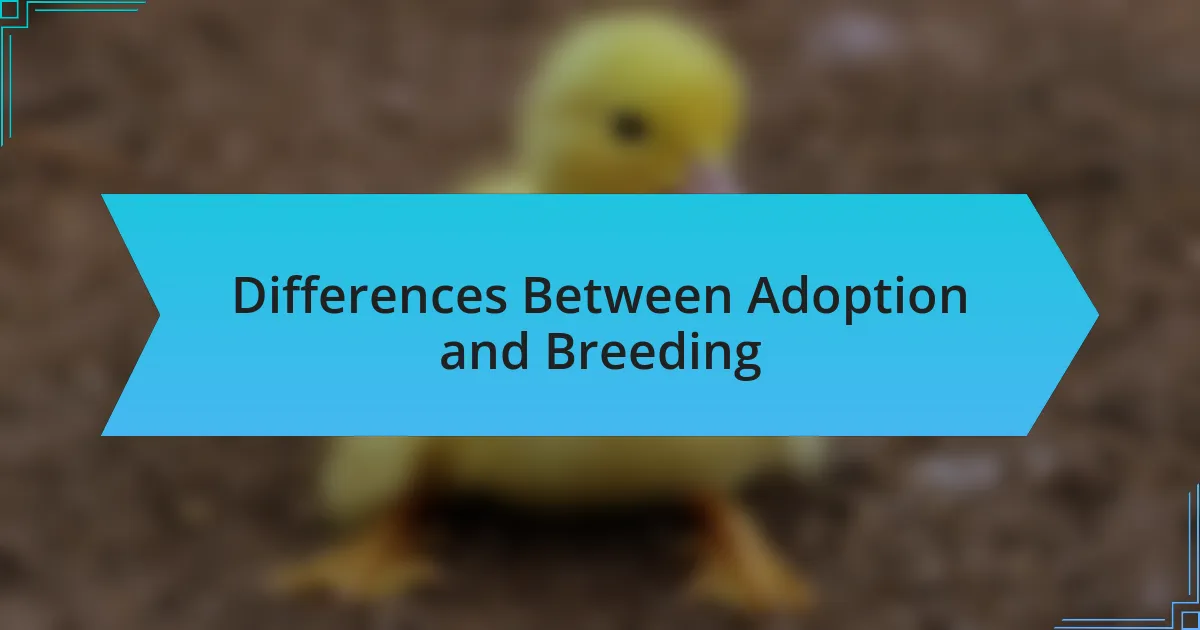
Differences Between Adoption and Breeding
When considering the differences between adoption and breeding, the most pronounced distinction is the underlying intention. Adoption is about giving a home to an animal in need, often from a shelter where countless pets await their forever families. I remember walking through a local animal shelter and being struck by the many hopeful faces, each with their own story, just waiting for someone to choose them. It always makes me ponder: isn’t it our responsibility to first provide for those already here rather than create more?
On the flip side, breeding often emphasizes specific traits, sometimes prioritizing appearance or performance over the animal’s well-being. I encountered a breeder showcasing her champion puppies, yet as she spoke about their lineage, I couldn’t help but feel a twinge of sadness for the many wonderful mixed-breed dogs that remain overlooked. Does seeking perfection in pets come at the expense of those who simply wish for companionship?
Additionally, while breeding can lead to new life, it can inadvertently contribute to the issue of pet overpopulation. I’ve seen passionate advocates for both sides—some devoted to rescuing animals while others are equally sure of the quality of bred pets. But, really, is it justifiable to produce more animals when we haven’t yet found homes for the ones already living among us? Exploring this question calls for patience and compassion, as we reflect on how we can contribute to a more harmonious relationship between animals and humans.
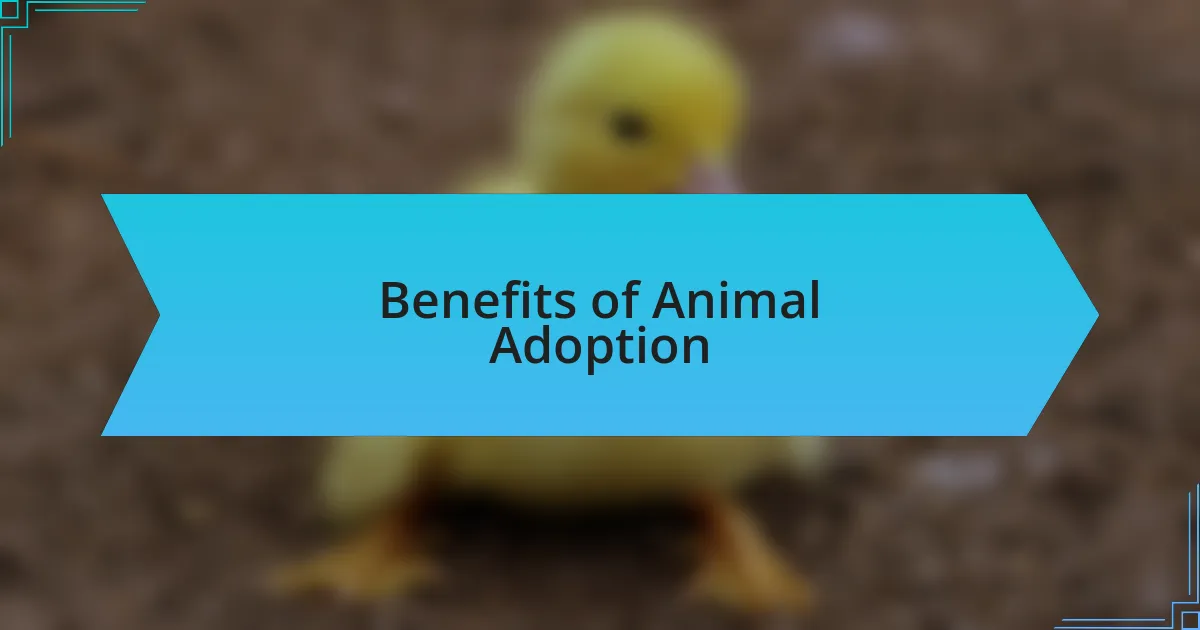
Benefits of Animal Adoption
One of the most compelling benefits of animal adoption is the profound joy it brings to both the animal and the adopter. For instance, I still remember the day I adopted my dog, Max. His tail wagged with such enthusiasm that it felt like he was giving me a piece of his heart right then and there. That connection isn’t just fulfilling; it enriches our lives in a way that is hard to put into words.
Moreover, adopting an animal often comes with a sense of purpose. When I volunteered at a shelter, I witnessed firsthand the transformation in animals that found their loving homes. It’s amazing to see how a simple act of kindness can help them flourish, allowing their personalities to shine. Isn’t there something deeply rewarding about knowing you played a part in giving an animal a second chance at happiness?
Additionally, adoption contributes significantly to combating the pet overpopulation crisis. By choosing to adopt, we help reduce the number of animals in shelters and spare many from the heartbreak of euthanasia. A small decision can have a ripple effect, leading to a more compassionate world where every animal has a place to call home. Have you ever thought about how your choice could save a life? For me, understanding that my adoption decision helped less fortunate animals makes it all feel worthwhile.
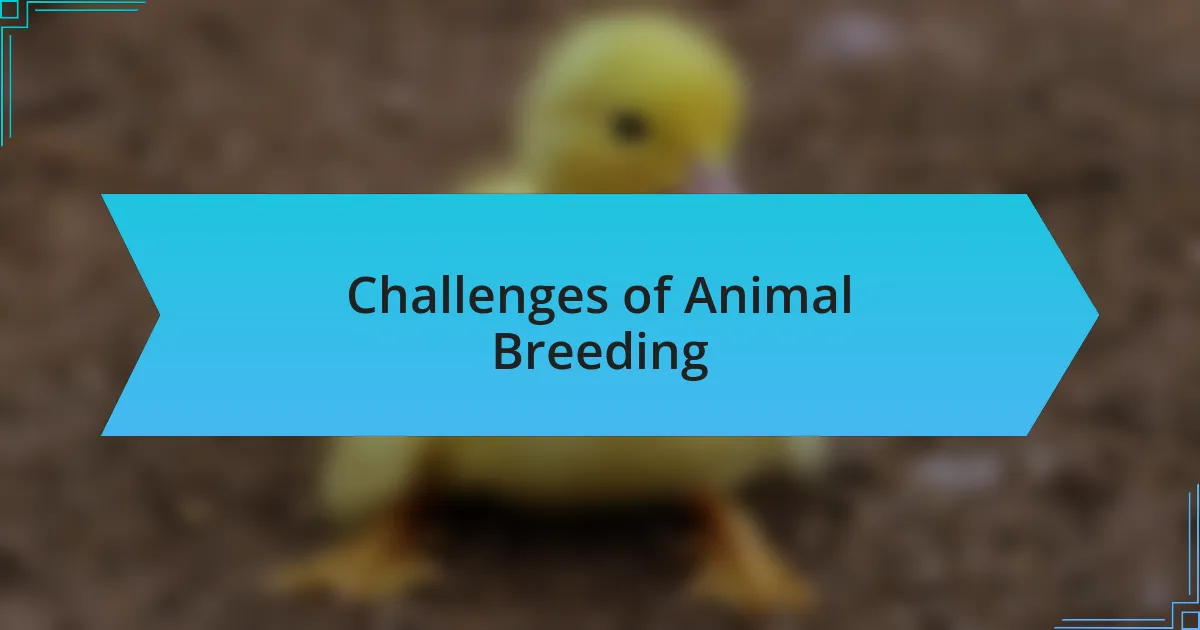
Challenges of Animal Breeding
Breeding animals often introduces a plethora of ethical challenges. I once visited a breeding facility, and what I saw was eye-opening. Animals were kept in cramped conditions, and it struck me how such environments could lead to both physical and psychological distress. This experience made me question whether the pursuit of purebred perfection is worth the consequences faced by these creatures.
Aside from the living conditions, breeding can lead to significant health problems due to genetic predispositions. For instance, certain breeds are known to be more vulnerable to inherited diseases. When I learned about the heartbreaking stories of dogs suffering from conditions that could have been avoided with responsible breeding practices, I couldn’t help but feel a deep sense of sadness. It’s tough to reconcile the love for a specific breed with the pain that often accompanies it.
Another challenge is the sheer number of animals that result from irresponsible breeding cycles, which contributes to the overpopulation crisis. Each time an irresponsible breeder brings new lives into the world, they often neglect the importance of finding loving homes for them. I’ve seen too many animals in shelters longing for families while more continue to enter the world without a chance. Isn’t it troubling to think about the lives cut short due to this cycle? When breeding prioritizes numbers over care and compassion, it becomes a disservice to the very creatures we claim to love.
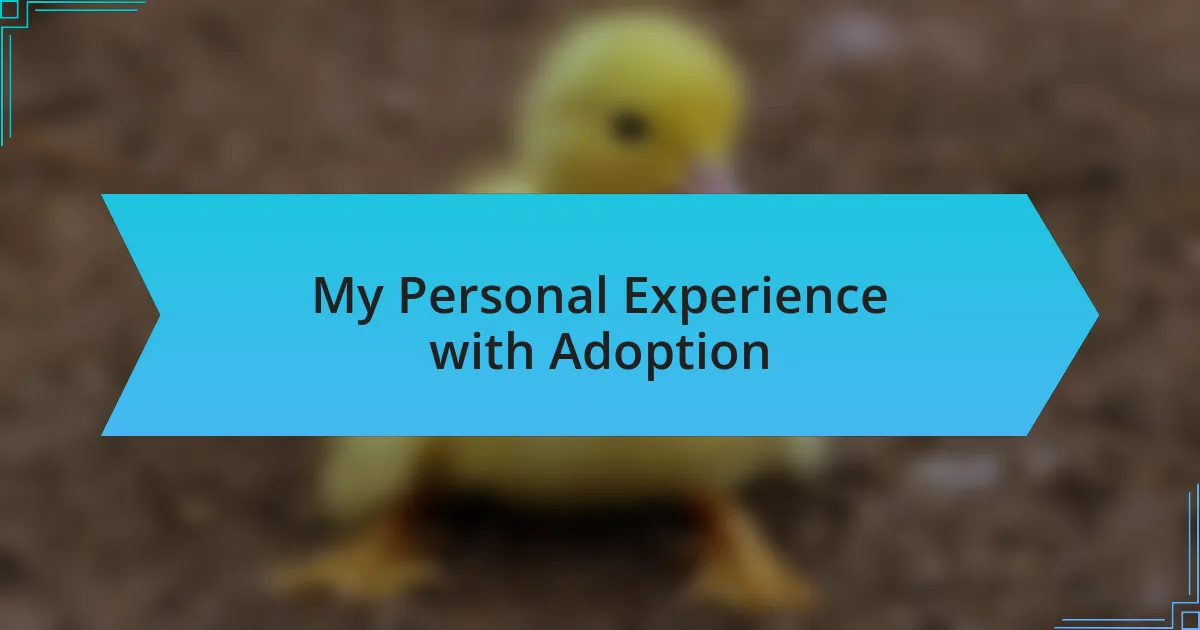
My Personal Experience with Adoption
Adopting my first dog was a transformative experience for me. I remember walking into the shelter, and there he was – a scruffy little mutt with big, hopeful eyes. As I sat on the floor, he approached me cautiously, then plopped himself in my lap, as if to say, “I’m ready to be your companion.” That connection was instant and profound, and I realized then how powerful adoption could be.
Since bringing him home, I’ve encountered challenges, but they’ve only deepened my appreciation for adoption. There were moments when he struggled with anxiety, likely stemming from his past, but learning to navigate those hurdles together forged an unbreakable bond between us. I often wonder how many loving animals are waiting for someone to see their potential amid their struggles. Each time I look into his eyes, I’m reminded of the resilience these creatures possess and how rewarding it is to help them heal.
Sharing my life with an adopted pet has opened my eyes to the importance of second chances. I’ve met other adopters through community events, and hearing their stories reaffirms my belief in the impact of giving shelter animals a loving home. It’s incredible to think about how many joyful, loving companions are out there, just waiting for someone to take a chance on them. How can we not feel compelled to share that love?